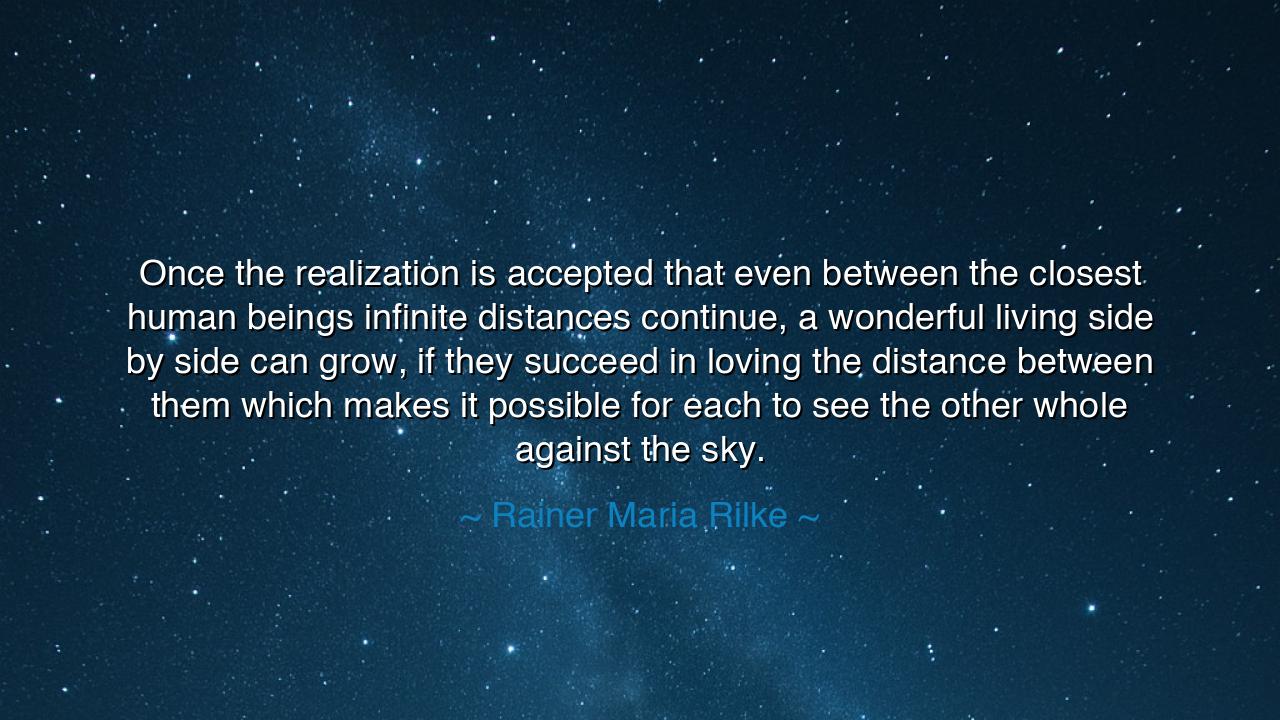
Once the realization is accepted that even between the closest
Once the realization is accepted that even between the closest human beings infinite distances continue, a wonderful living side by side can grow, if they succeed in loving the distance between them which makes it possible for each to see the other whole against the sky.






"Once the realization is accepted that even between the closest human beings infinite distances continue, a wonderful living side by side can grow, if they succeed in loving the distance between them which makes it possible for each to see the other whole against the sky." – Rainer Maria Rilke
From the pen of Rainer Maria Rilke, the poet-philosopher of the soul, flows this profound truth — a truth that reveals the sacred balance between love and freedom. To Rilke, the human heart is both a sanctuary and a universe. He understood that in love, as in all things divine, there exists a mystery that cannot be fully bridged. When he speaks of “infinite distances” between even the closest beings, he does not lament them — he honors them. For in those distances lies the possibility of true seeing, of loving another not as an extension of oneself, but as a vast and separate soul, complete in its own beauty.
In the ancient days, the sages spoke of love as the meeting of two fires — each burning brightly, yet never consuming the other. Rilke’s wisdom echoes this eternal principle. Love, he says, is not the erasure of difference but the reverence of it. To “love the distance” is to recognize that every soul carries its own depth, its own secrets, its own path beneath the stars. And when two souls honor that sacred distance — when they do not seek to possess or to merge, but to see one another whole against the sky — then, and only then, does a wonderful living side by side emerge.
The origin of Rilke’s thought can be traced to his own life — a life shaped by solitude, art, and the search for authentic connection. He believed that to love truly, one must first learn to stand alone. In his Letters to a Young Poet, he writes that love should not be about the melting together of two beings, but rather the guarding of each other’s solitude. He knew that when love becomes an attempt to fill the emptiness within, it collapses under its own need. But when it is rooted in respect for the infinite distance between two souls, it blossoms into something lasting, radiant, and free.
Consider the story of Antoine de Saint-Exupéry and his wife, Consuelo, whose love inspired the timeless tale The Little Prince. Their relationship was tempestuous and filled with separations, yet their bond endured across continents and years. In their letters, one hears echoes of Rilke’s wisdom — they could not always live peacefully together, but they loved each other’s distance, the very space that allowed each to grow, to create, to dream. When Saint-Exupéry wrote of the prince gazing at his rose from afar, he was also speaking of love’s paradox — that sometimes we must step back to truly see the other’s beauty.
To “love the distance” does not mean to be cold or detached. It means to honor individuality within intimacy. It is to say: “I do not need to own you to love you. I will walk beside you, not before you or behind you.” Such love does not bind — it liberates. It allows each soul to reach its highest potential, to stand whole beneath the heavens. Just as the stars do not collide but shine more brilliantly because of the space between them, so too can human beings love more deeply when they embrace distance as part of the divine design.
Yet this teaching is not easy. Many seek comfort in closeness, in the illusion that love is unity without separation. But the wise know that closeness without respect for distance leads to suffocation. Rilke calls us to a higher form of love — one that endures through time and change because it accepts the eternal mystery between hearts. In this way, love becomes not a cage, but a cathedral of freedom, where two souls worship side by side, each facing the same infinite sky.
So remember this, children of the living light: to love another, you must also love their distance. Do not fear the silence between you; it is the space where trust and reverence dwell. Let your love be like the horizon — vast, unbroken, allowing each soul to stand in its own light. When you can look upon the one you love and see them whole, complete, and free, you have touched the truth Rilke spoke of.
For in the end, love is not the conquest of distance — it is the celebration of it. And in that celebration, two souls, infinite yet connected, stand together beneath the eternal sky — not as halves seeking completion, but as whole beings reflecting the divine symmetry of the universe itself.






AAdministratorAdministrator
Welcome, honored guests. Please leave a comment, we will respond soon